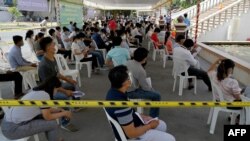Prime Minister Hun Sen instructed the Health Ministry to prepare guidelines to treat people with mild COVID-19 symptoms in their homes, as the recent surge in cases puts immense pressure on the country’s shaky healthcare system.
In an audio message released on Tuesday, Hun Sen said the ministry should create a “code of conduct” for treating patients in their homes safely, without risking the health of other family members in the household.
“We can’t treat everyone [at a hospital] if cases increase more and more. There are fewer recoveries than the new cases,” he said on Tuesday.
“Even we add more health facilities, they are still insufficient. The only solution is to keep patients with mild symptoms for treatment at home,” he added.
The prime minister said that at least 50 percent of patients were willing to be treated at home.
“I think we will reach that point where the February 20 event has not gotten better, especially in Phnom Penh and Kandal province,” he said.
Cambodia has recorded 2,293 cases of COVID-19 since February 20, the most recent community transmission incident, and has reported 22 deaths attributed to the disease. The Health Ministry on Tuesday said that there are currently 1,003 patients who are being treated at health facilities across the country.
The explosion of cases resulted in the government turning The Great Duke hotel in Phnom Penh into a makeshift hospital and the nationalization of the Nokor Tep Women’s Hospital with private donations from influential business tycoons and corporations.
Hun Sen added that each patient would be given 20,000 riels, or $5, per day for home treatment. He also wanted more mobile medical teams to help with the new effort.
Home treatment has been routinely used in different countries to ease the strain on hospitals and limited resources, such as ICU beds and ventilators.
The U.S. Centers for Disease Control and Prevention recommends that anyone with mild symptoms or an asymptomatic case can isolate at home and need not be hospitalized.
It recommends isolating the sick person in a “sick room” and, ideally, have them use a separate bathroom, monitor their symptoms routinely, not share anything with the patient, and encourages the wearing of masks.
The World Health Organization states that people with high-risk factors, such as the elderly, people who are smokers, obese, have non-communicable diseases like cardiovascular disease or diabetes, might need further evaluation before being recommended for home treatment.
Additionally, the WHO guidelines recommend adequate handwashing, no visitors, safe disinfecting of the sick person's room, and safe cleaning or disposal of materials used by the patient.
The Cambodian government has been concerned about people evading or escaping from home quarantine and dedicated facilities, passing a new COVID-19 law that strongly penalizes people who “intentionally spread the disease” with up to 10 years in prison.
Meas Nee, a social and political analyst, urged the government to create a clear plan to implement the proposed home treatment of COVID-19 patients by ensuring a strict monitoring system that prevents people from breaking the rules.
“If they are being treated at home and they can still go out so [the situation] will be even worse and can get out of control in the future,” he said.








